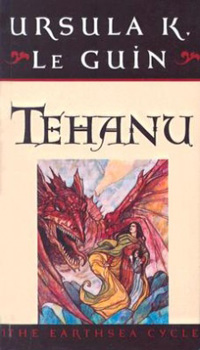Seventeen years after The Farthest Shore (1973) came Tehanu (1990). In that time an awful lot happened. One of those things was second wave feminism, and Le Guin, always a feminist, always ahead in thinking about gender issues, looked back at Earthsea and feminist criticism of Earthsea, and saw that she had done a lot of things without thinking because of the way the weight of story pulled her. I’m pretty sure that she wrote Tehanu to try to address some of this directly, not to revise but to revision Earthsea, to give women a voice. If the first trilogy are, as Le Guin said, male and female coming of age and death, this is being a woman. (Calimac suggests The Farthest Shore is the book of the old man, and Tehanu is the book of the old woman, but I don’t think so. Ged is 50 in The Farthest Shore and Tenar is in her early forties here, and not even at menopause.)
Another thing that changed between 1973 and 1990 was the existence of genre fantasy. In 1973 there was really nothing but The Lord of the Rings and the scattered predecessors Lin Carter published as the Ballantine Adult Fantasy series. Genre fantasy was created by people reading and reacting to Tolkien. Lester Del Rey published The Sword of Shannara (1977) as “look, we have more of this stuff”. By 1990 there was a lot of it. Le Guin had written the earlier Earthsea books for children, giving them young protagonists as viewpoints. Now she didn’t need to, there were adult readers who would buy fantasy. She could write an adult fantasy novel, and she did.
I gnash my teeth when I see Tehanu published in a children’s book line and a matching edition to the others, and in children’s libraries. I think it quite right that there be stories written that are aimed at adults, I don’t think everything should be or can be accessible to children, and I deplore the use of “adult” and “mature” to mean “with sex”. Children will generally roll their eyes at “kissing books”. But I don’t see much point in putting a book on children’s shelves that’s so very much one with genuinely adult themes—seeing your children grow up, coping with a child who has been abused, finding a way to live your daily life.
The other thing that happened was that I’d grown up. I was nine when I read the first three and twenty-five when I read Tehanu. I read it while about as immured in femininity as it is possible to be, lactating and with a small baby in a sling either sleeping or failing to sleep as I read. I read some of it aloud to try to soothe him to sleep. (It reads aloud beautifully. All Le Guin does.) I should have been sympathetic to what she was doing. I certainly wanted to be. I noticed that everything in Tehanu was implicit in the last paragraph of The Farthest Shore. But I didn’t want Ged to have lost his power, and I didn’t think domesticity was any replacement for it. I didn’t quite believe in Tenar’s life as a farmwife on Gont—there’s something false about it. I suppose I had, between nine and twenty-five, imagined things Tenar might have been doing.
I also felt, and still feel, that Le Guin is speaking with a double tongue in this book. On the one hand she’s saying very clearly that women’s domestic lives are central and important, and on the other the force of story is bending everything to have an actual plot, which needs an evil wizard and men and the world of action. The burned child Therru, who has been raped and survived, calls the dragon to the rescue. It’s too easy an answer, as well as being a nice trick if you can do it. And it denies the centrality of the importance of the well lived life. She says that women’s lives matter, but she shows that they don’t, that what matters is magic and power and calling on dragons. This is a restless book with very strange pacing.
Tehanu is a very problematic book for me, one I’ve thought about a great deal. Even when I don’t enjoy reading Le Guin she always makes me think. I’m much more sympathetic to what she was trying to do in Tehanu than before I’d tried it myself—there’s a whole weight of expectation to do with the way stories go that she was trying to roll uphill singlehanded to make this book work, and it’s amazing it works as well as it does. But if you want a feminist fantasy about small scale domestic life, I recommend Phillis Ann Karr’s At Amberleaf Fair. And if you want Le Guin telling confident fantasy stories set in worlds where women are people, I recommend the Western Shore trilogy.
Jo Walton is a science fiction and fantasy writer. She’s published eight novels, most recently Half a Crown and Lifelode, and two poetry collections. She reads a lot, and blogs about it here regularly. She comes from Wales but lives in Montreal where the food and books are more varied.










